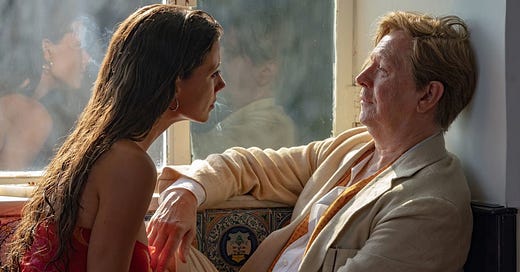Parthenope
A gorgeous movie about the most beautiful woman in Italy, this fantasy/romance/something is full of arresting moments that don't add up to any kind of coherence.
What a gorgeous muddle.
“Parthenope” is the sort of movie loved by filmmakers and film professors and film critics. The regular ticket-buying masses, not so much.
This Italian/French production focuses on the title character, an Italian woman who took the former Greek name for her city, Naples, after being born to one of its leading families literally in the waters like some sort of mythological goddess. She grows into the most beautiful woman in Italy, someone who makes people stop and stare wherever she goes.
Played by Celeste Dalla Porta, Parthenope is part muse, part tragic heroine, part tease. Although basically good-hearted, she can’t help plying her looks to her advantage, and seems to take quiet delight in making men stumble and sputter around her. She takes great pains to let everyone know there’s a brain and will behind that beatific exterior, refusing to stay put in the various boxes her admirers would stick her in.
Writer/director Paolo Sorrentino (“The Hand of God”) shoots Dalla Porta like a celestial being, dark hair cascading and soft eyes flashing coyly. Every moment is made to seem iconic. Think Ursula Andress emerging from the ocean in a white bikini in “Dr. No,” Brigitte Bardot in “And God Created Woman” or Rita Hayworth ‘doing that sh*t with her hair’ in “The Shawshank Redemption.”
(Actually, “Gilda.”)
Spanning the years 1968 to 1974 (with a modern coda), “Parthenope” follows her exploits from teen ingenue to more self-assertive young woman, her various romantic entanglements and her budding interest in, of all things, anthropology.
There really isn’t a narrative throughline here; it’s more a series of moments that, while individually arresting, don’t join together into any kind of coherence. It feels more like a bunch of little stories rather than one grand one. At a tick over 2¼ hours long, the movie certainly drags at times.
Initially the primary energy centers around a love triangle with her older brother, Raimondo (Daniele Rienzo and her first boyfriend, Sandrino (Dario Aita). Parthenope toys with both of them, dancing with and dallying with other men, while making sure to let them see her doing it. Eventually, tragedy intrudes which sets her on a more sober path.
She applies to and is accepted into the local university, and gradually comes to gain the respect of Moratta (Silvio Orlando), the stern old anthropology professor who takes delight in ripping to pieces the theses of his students. He seems to be the one man in the world unaffected by her beauty, or at least indifferent to it. Later, their relationship will grow more important, though still in a non-romantic way.
Parthenope bumps into various other celebrities along the way, some who push her to become a film actress, or ‘diva’ in their parlance. Greta Cool (Luisa Ranieri ) is the epitome of this sort of thing, haughty and commanding. Between this off-putting figure and a mysterious acting teacher, Flora Malva (Isabella Ferrari), who always keeps her face covered owing to botched plastic surgery, Parthenope decides the thespian life is not for her.
“It’s like kissing a beautiful mouth and finding it has no teeth,” is how she puts it.
She also has an extended encounter with American author John Cheever, played by Gary Oldman as a sort of charming, doomed figure who sits about Naples, getting drunk and people-watching. “Are you aware of the disruption that your beauty causes?” he asks her.
It’s a poignant and lovely mini-romance — Parthenope actually asks Cheever’s permission to fall in love with him — made impossible, of course, by his preference for men. Honestly, this section so crackles with energy and emotion I wanted the movie to continue exploring this path, but more random adventures await.
Things go on from there, and the movie grows increasing chaotic and untethered to any kind of narrative form. The last third is almost surrealistic, as Parthenope has a one-night stand with Roberto Criscuolo (Marlon Joubert), a young prince of the city beloved by the masses, allows herself to be seduced by a loathsome bishop, and gets to meet her professor’s homebound son.
Dalla Porta is indeed an unforgettable presence, though as the movies goes on I increasingly wondered if there really was more to “Parthenope” than meets the eye. Beauty fades, as they say, but its ability to compel our interest on its own also has a short shelf life.





